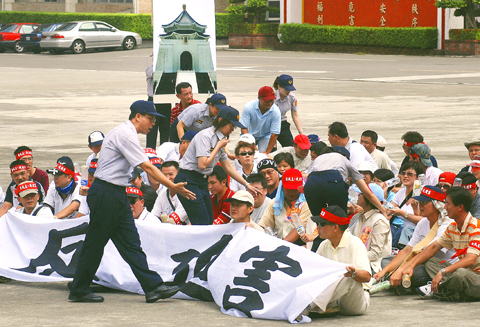With the country preparing to receive an influx of Chinese tourists tomorrow, a Taipei City councilor warned of the possible threats the tourists pose to the city’s environment and public safety, and the difficulty local governments will face in trying to punish those who violate the law.
Independent Taipei City Councilor Chen Chien-ming (陳建銘) said it would be difficult for the Taipei City Government and other government agencies to trace Chinese tourists who violate regulations, such as those against spitting or throwing cigarette butts in public places, to fine or otherwise punish them.
“The city government should conduct assessments on all the possible impacts of Chinese tourists. I call upon the city government to set up regulations to handle violations made by Chinese tourists,” Chen told a press conference at the Taipei City Council.

PHOTO: CHIANG YING-YING, AP
Under the agreements signed in Beijing last month between the Straits Exchange Foundation and China’s Association for Relations Across the Taiwan Straits, a 600-member inaugural Chinese tour group will arrive in this country tomorrow when the two sides launch weekend charter flights.
President Ma Ying-jeou (馬英九) has pledged to open Taiwan to 3,000 Chinese tourists per day in the initial stage, with the number increasing to 10,000 per day within four years.
In response to Chen’s concerns, Taipei’s Law and Regulation Commission said that the rules regulating Chinese tourism allow the city government to issue tickets to tourists who break the law.
The department said the city government was allowed to ask tourists who violated regulations to pay the fines immediately, and to fine the travel agencies handling the offenders if the tourists failed to pay.
Liang Hung-lang (梁宏郎), a division chief of the city’s Environmental Protection Department, said if Chinese tourists violated environmental regulations, the department will fine them and ask the travel agencies to help handle the situation.
Meanwhile, the National Police Agency staged a mock exercise to simulate potential situations they might have to deal with because of the influx of Chinese visitors.
Police officers from various tourist spots nationwide took part in the exercise.
Among the scenarios included in the exercise were police intervening to prevent Chinese visitors from being forced by vendors to buy souvenirs or visitors forcing vendors to sell them souvenirs, and Chinese visitors encountering people demonstrating against them.
Minister of the Interior Liao Liao-yi (廖了以) watched the exercise and afterward said the simulation had made him optimistic about the police departments’ ability to handle any problems.
“Our officers are professional in what they do,” he said.
“It seems to me that they know how to fix problems, if there are any, within the shortest period of time. This is exactly what we need,” he said.

The manufacture of the remaining 28 M1A2T Abrams tanks Taiwan purchased from the US has recently been completed, and they are expected to be delivered within the next one to two months, a source said yesterday. The Ministry of National Defense is arranging cargo ships to transport the tanks to Taiwan as soon as possible, said the source, who is familiar with the matter. The estimated arrival time ranges from late this month to early next month, the source said. The 28 Abrams tanks make up the third and final batch of a total of 108 tanks, valued at about NT$40.5 billion

Two Taiwanese prosecutors were questioned by Chinese security personnel at their hotel during a trip to China’s Henan Province this month, the Mainland Affairs Council (MAC) said yesterday. The officers had personal information on the prosecutors, including “when they were assigned to their posts, their work locations and job titles,” MAC Deputy Minister and spokesman Liang Wen-chieh (梁文傑) said. On top of asking about their agencies and positions, the officers also questioned the prosecutors about the Cross-Strait Joint Crime-Fighting and Judicial Mutual Assistance Agreement, a pact that serves as the framework for Taiwan-China cooperation on combating crime and providing judicial assistance, Liang

A group from the Taiwanese Designers in Australia association yesterday represented Taiwan at the Midsumma Pride March in Melbourne. The march, held in the St. Kilda suburb, is the city’s largest LGBTQIA+ parade and the flagship event of the annual Midsumma Festival. It attracted more than 45,000 spectators who supported the 400 groups and 10,000 marchers that participated this year, the association said. Taiwanese Designers said they organized a team to march for Taiwan this year, joining politicians, government agencies, professionals and community organizations in showing support for LGBTQIA+ people and diverse communities. As the first country in Asia to legalize same-sex

MOTIVES QUESTIONED The PLA considers Xi’s policies toward Taiwan to be driven by personal considerations rather than military assessment, the Epoch Times reports Chinese President Xi Jinping’s (習近平) latest purge of the Chinese People’s Liberation Army (PLA) leadership might have been prompted by the military’s opposition to plans of invading Taiwan, the Epoch Times said. The Chinese military opposes waging war against Taiwan by a large consensus, putting it at odds with Xi’s vision, the Falun Gong-affiliated daily said in a report on Thursday, citing anonymous sources with insight into the PLA’s inner workings. The opposition is not the opinion of a few generals, but a widely shared view among the PLA cadre, the Epoch Times cited them as saying. “Chinese forces know full well that